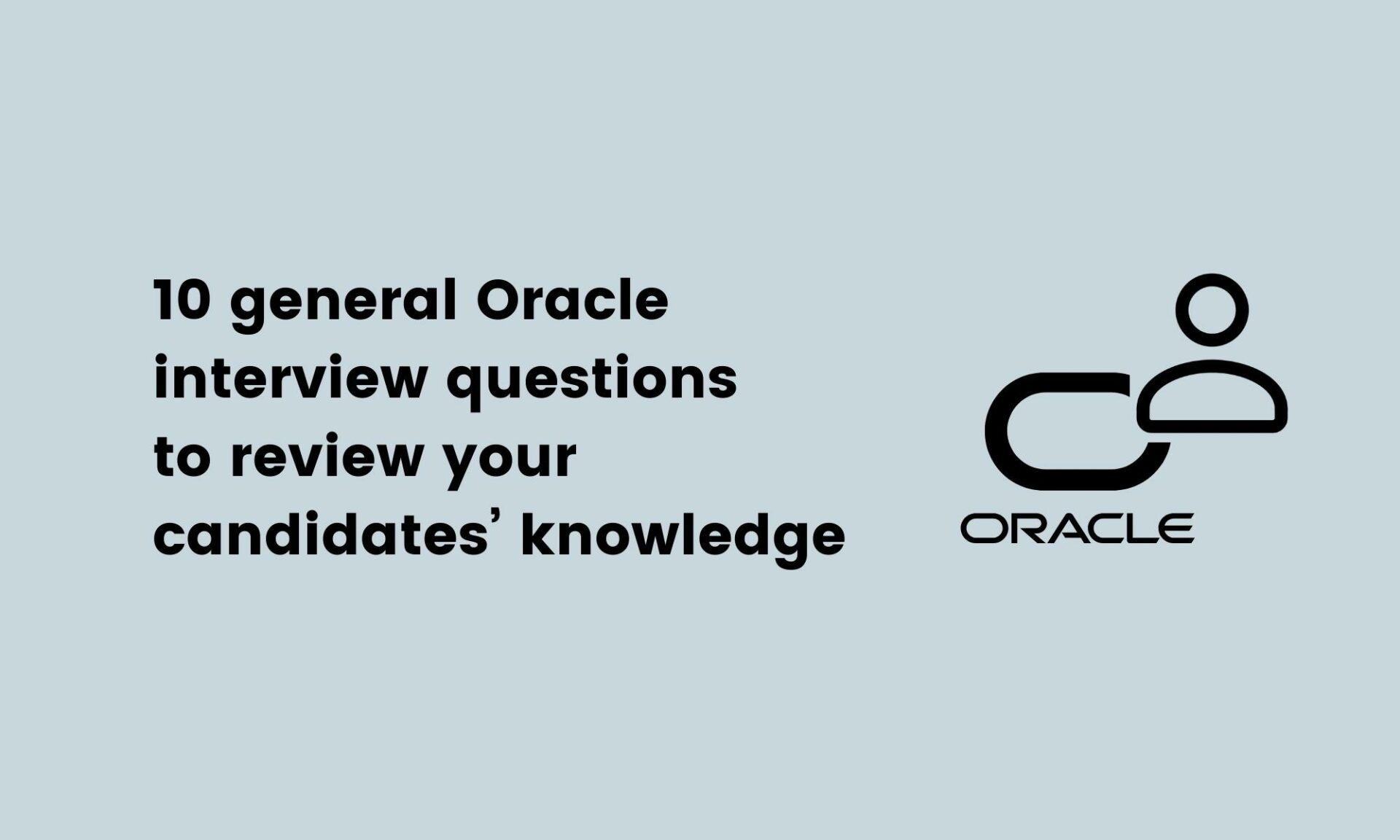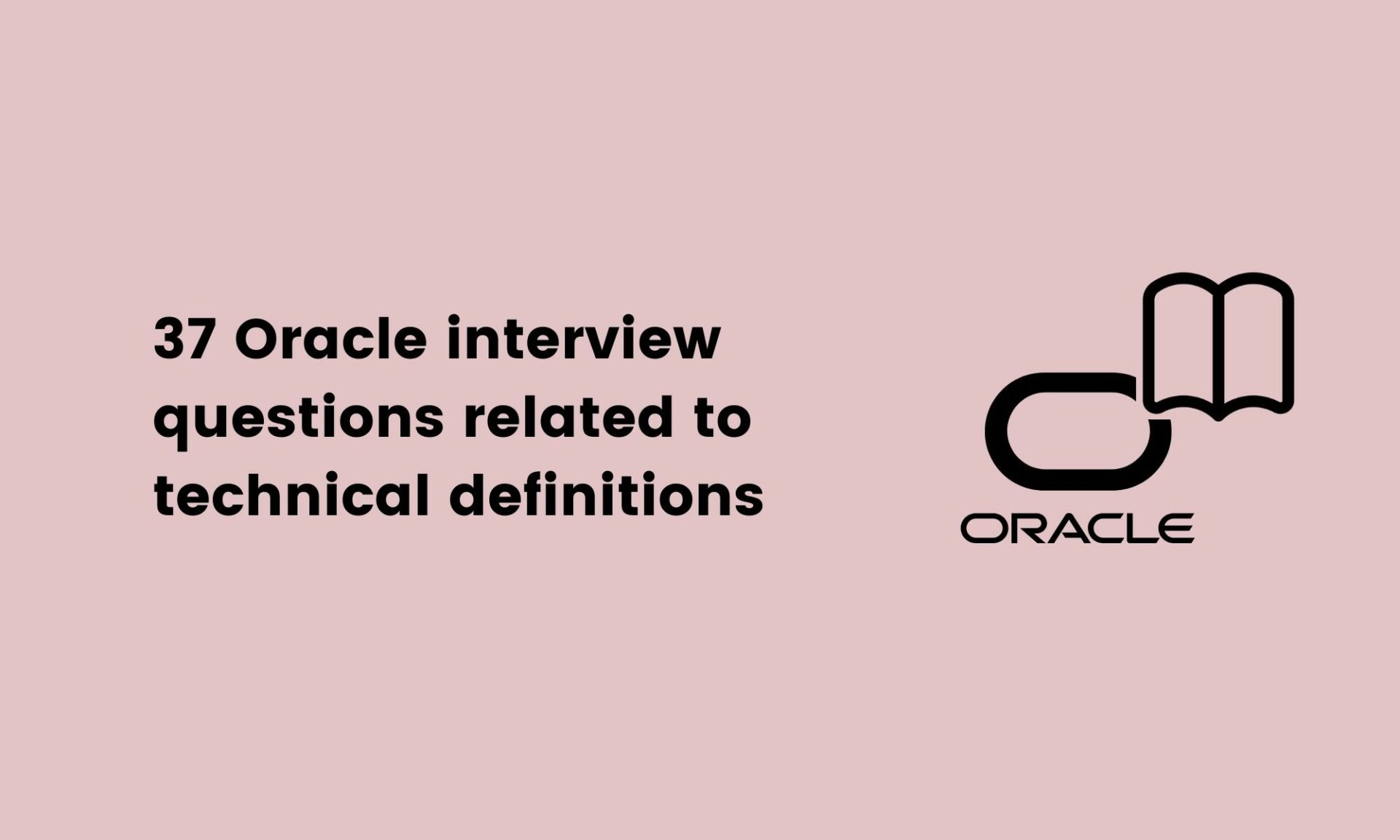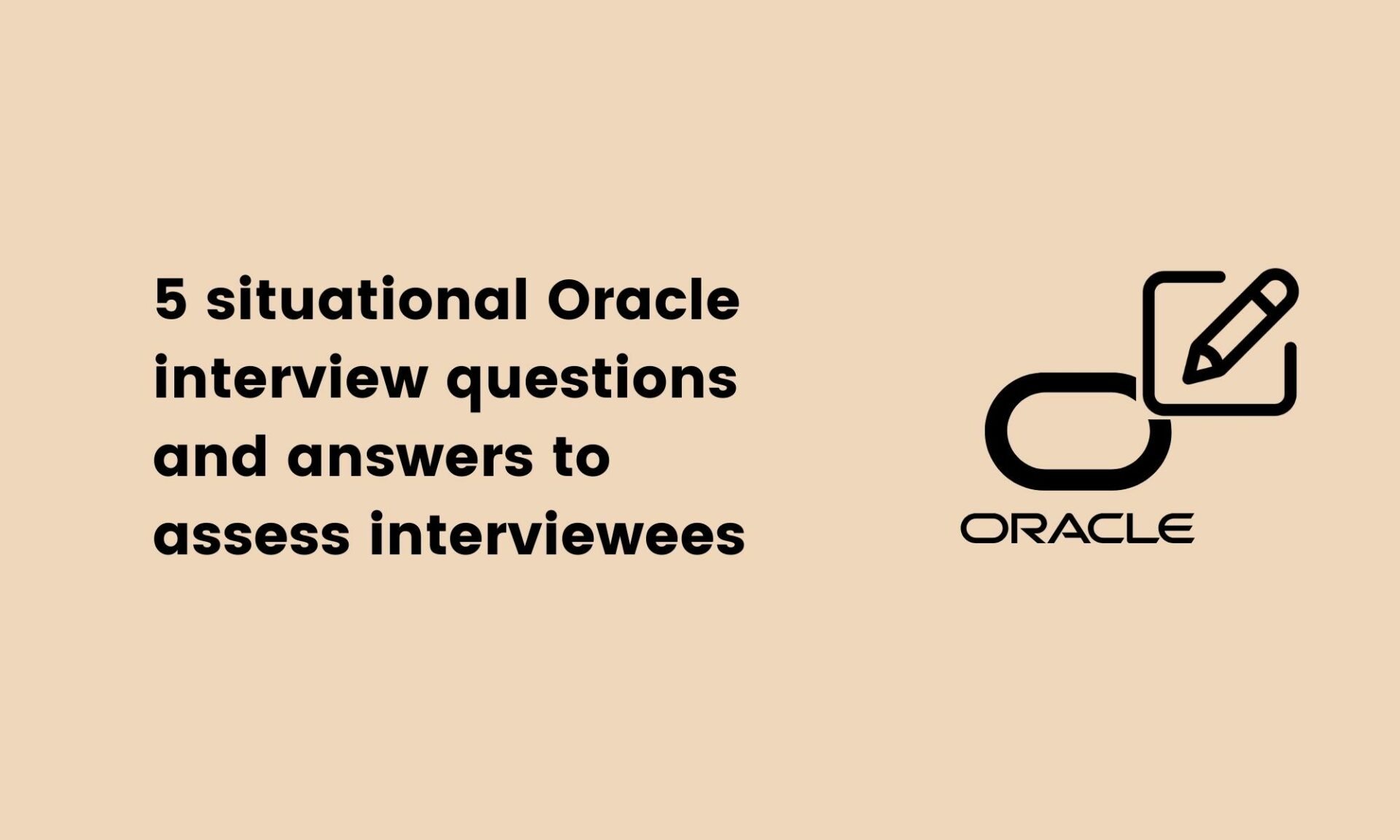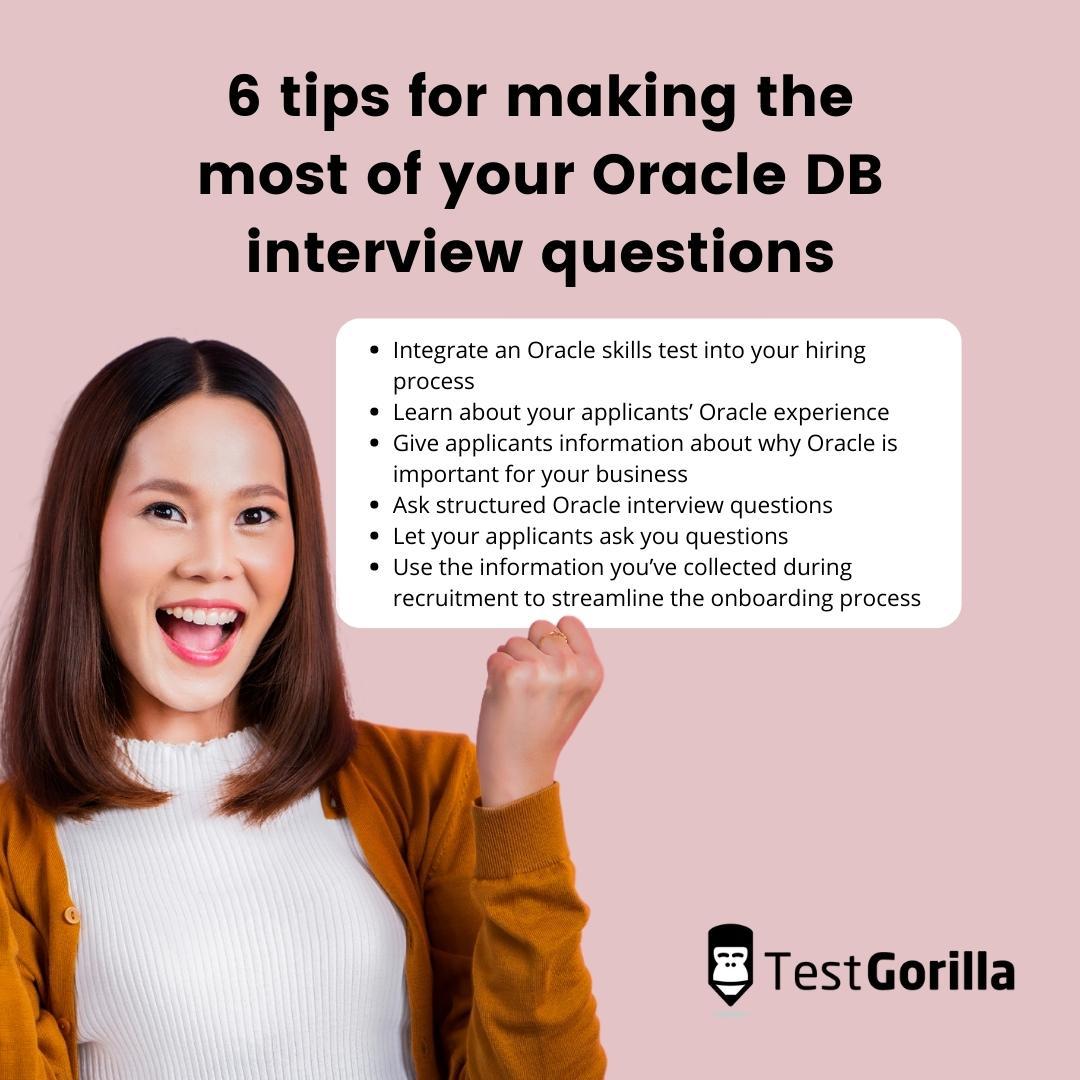52 Oracle interview questions to assess applicants’ skill
The Oracle database is one of the best database management systems (DBMS) for managing information, data, and applications when used correctly.
So, if you’re looking for the best Oracle professionals to join your business and handle your relational database management systems, you must find out whether your applicants have top Oracle skills.
Our Oracle skills test is the fastest way to review applicants’ knowledge. After that, you can invite the best applicants to an interview to determine if their expertise really suits your organization.
You’ll have no trouble interviewing applicants with the 52 Oracle interview questions and 15 sample answers listed in this article. Take a look at the questions below to build your own list of questions.
Table of contents
- 10 general Oracle interview questions to review your candidates’ knowledge
- 5 general Oracle DB interview questions and answers
- 37 Oracle interview questions related to technical definitions
- 10 Oracle interview questions and answers about technical definitions
- 5 situational Oracle interview questions and answers to assess interviewees
- 6 tips for making the most of your Oracle DB interview questions
- When should you use these interview questions for Oracle DBA recruitment?
- Why should you use an Oracle skills test during the recruitment process?
- Hire the best engineers and Oracle DBAs by asking the right Oracle interview questions
10 general Oracle interview questions to review your candidates’ knowledge
Here are 10 general Oracle interview questions you can ask applicants at the beginning of interviews to learn more about their experience.
What is the language engineers use to program Oracle?
Name two skills that Oracle engineers need when working on projects.
Name two soft skills that Oracle engineers need to be successful in their roles.
How vital are DevOps skills for Oracle engineers?
How vital are problem-solving skills for Oracle engineers?
How important is time management for Oracle engineers?
Describe your experience using Oracle.
Explain how you remain up-to-date with relational database management systems.
Name two advantages of the Oracle RDBMS.
What features do you dislike about Oracle?
5 general Oracle DB interview questions and answers
Check the sample answers to these five Oracle interview questions to determine whether your applicants’ general Oracle knowledge matches your expectations.
1. How vital are problem-solving skills for Oracle engineers?
Problem-solving skills are critical for Oracle engineers. Can your applicants explain that problem-solving abilities help developers to implement software, address problems, or plan and execute updates?
Applicants may provide an example of how they have used advanced problem-solving skills to handle software updates with minimal effort, but if you want to test this ability more thoroughly, consider our Problem-solving test.
2. How important is time management for Oracle engineers?
Do your applicants understand how important time management is for Oracle engineers? Handling projects within a specific time limit is essential for practically all roles in software development. It’s vital that applicants can break large projects in chunks and handle all tasks efficiently and within the allotted timeframes.
3. Name two advantages of the Oracle RDBMS.
Skilled Oracle engineers should know that Oracle offers plenty of advantages. For example, Oracle offers exceptional data security and scalability.
Additionally, its database performance is outstanding and engineers can use it to manage their data in a cloud environment.
4. Name two skills that Oracle engineers need when working on projects.
Do your applicants know which technical skills Oracle engineers need to be successful?
If they do, they may mention different examples of critical Oracle skills, such as experience with SQLite and knowledge of Oracle Forms (which you can assess with our skills tests).
And since Oracle Forms proficiency depends on HTML, CSS, and JavaScript skills, it might be important to review candidates’ experience in those domains, too.
5. Name two soft skills that Oracle engineers need to be successful in their roles.
Candidates might give different answers to this question, but they should be able to explain their reasoning behind each soft skill they name.
For example, attention to detail and critical thinking are two of the most important soft skills that Oracle engineers need when working on projects.
Can your candidates explain why these are essential skills? Do they have an example of how they have used their attention to detail to analyze data and spot patterns?
The best insights on HR and recruitment, delivered to your inbox.
Biweekly updates. No spam. Unsubscribe any time.
37 Oracle interview questions related to technical definitions
Here are 37 Oracle interview questions related to technical definitions. Use them to dig deeper and learn more about your candidates’ Oracle expertise.
Explain what varchar data types are.
Explain what varchar2 data types are.
Explain what the RAW datatype is.
Outline what the NVL function does.
What does the months_between function do in Oracle?
Define nested tables.
Explain what the COALESCE function does.
Explain what the BLOB data is.
Define what DML means in Oracle.
Explain what TRANSLATE does.
Outline what REPLACE does.
What does the AGGREGATE function do in Oracle?
Explain what a subquery is.
Name and explain the two subqueries in Oracle.
Explain what rename means.
Clarify what alias means.
Define what a cursor variable is.
Explain what a cursor attribute is.
Explain what SET operators are.
Outline what ROWID is for in Oracle.
Explain what a hash cluster is.
Define constraints.
Explain what SUBSTR does.
Describe what INSTR does.
What is a table data object in Oracle?
What is a sequence in Oracle?
What is an index in Oracle?
Explain what the NULL value is in Oracle.
Define what the USING clause is in Oracle.
What does the WITH CHECK OPTION clause do?
Explain what an alert is in Oracle.
Explain what an integrity constraint is.
Which three parameters can engineers pass to a procedure in Oracle?
Define grants in Oracle.
Explain what $ORACLE_BASE is.
Explain what $ORACLE_HOME is.
Describe what the GROUP BY clause does.
10 Oracle interview questions and answers about technical definitions
Below, you’ll find sample answers to 10 of the technical Oracle interview questions from the previous section.
Use them to evaluate your candidates’ responses and reliably assess their knowledge and relational database management skills.
1. Explain what grants are in Oracle.
Expert Oracle engineers should know that they can grant users privileges (such as SELECT, DELETE, INSERT, ALTER, UPDATE, REFERENCES, INDEX, or ALL) to ensure they can access the objects and perform various actions. They may also explain that an object’s creator is the one who can provide grants to objects.
2. Explain what a hash cluster is.
Applicants with sufficient knowledge of the Oracle RDBMS should know that a hash cluster is a method engineers use to store a table. Your candidates may also explain that the storage process enables engineers to retrieve tables faster. Engineers apply hash values to the table for fast row retrieval as well.
3. Describe what the GROUP BY clause does.
Interviewees who fully understand the GROUP BY clause will know that engineers use it to collect data from several records. They may also explain that this clause enables engineers to group the results into several columns.
4. Explain what the COALESCE function does.
Do your interviewees know that the COALESCE function is vital for returning particular values that engineers haven’t set to NULL? Can they explain that if they use the COALESCE function, this process will return NULL when every value is NULL?
5. Define what DML means in Oracle.
If your applicants have sufficient experience with this RDBMS, they will know that DML means data manipulation language. Engineers use DML statements to access and handle data that exists in objects.
Can your applicants name some DML statements, such as INSERT, DELETE, and UPDATE?
6. Explain what an alert is in Oracle.
Do your applicants know that alerts in Oracle are options to establish a distribution list for messages? Are they aware that an alert enables engineers to make a list without already knowing which recipients they want to include on the list?
Candidates may explain how Oracle alerts work and mention that the function retrieves the mail IDs from the tables and sends messages automatically.
7. Explain what an integrity constraint is.
Can your interviewees explain that integrity constraints are declarations that organizations set to define rules for columns in tables? They may also mention that different integrity constraints exist, including unique, not null, foreign, and primary key integrities.
8. What is a table data object in Oracle?
Applicants should know that a table data object is an object that features various elements. Engineers arrange the elements in a table data object into vertical and horizontal formats, hence the name “table” objects.
9. Which three parameters can engineers pass to a procedure in Oracle?
Candidates who have applied to your vacancy and have exceptional Oracle RDBMS knowledge should know that the three parameters engineers use to pass a procedure are INOUT, IN, and OUT.
10. Define what a cursor variable is.
Engineers can link cursor variables with many statements. Applicants may explain that cursor variables aren’t restricted to a single query and that they can create them by declaring a variable, which makes a pointer. This pointer holds the addresses of some items and not the specific items themselves.
5 situational Oracle interview questions and answers to assess interviewees
Here are five situational Oracle interview questions and answers to assess how your interviewees’ would act when solving difficult problems and working on complex projects.
1. Which methods would you use to represent a comment in Oracle?
Interviewees may mention a couple of methods when responding to this Oracle interview question.
They may explain that using two dashes before the start of a line is one way to represent a comment. This comment is known as a single statement comment. Interviewees may also mention that using two asterisks separated by a long underscore is another method to represent a comment. This comment is known as a block statement comment.
2. Which method would you use to avoid duplicates when displaying table rows?
If an engineer wants to avoid duplicates when displaying table rows, there’s a particular keyword for this. Applicants should know that using the DISTINCT keyword in a select statement will help them avoid duplicates.
3. Which method or function would you use to retrieve a table’s field data?
Interviewees should explain that when engineers use the Describe <Name_of_Table> method, they can retrieve the field details of the table they have specified in Oracle.
4. Explain how you would store an image in a database.
Your applicants should have extensive experience with Oracle in their current and previous roles.
If that’s the case, they should know that it’s possible to store images in a database by a particular data type. Candidates should know that the long raw data is ideal for storing images, enabling them to store binary data of up to two gigabytes.
5. Explain how you would display the numbers of rows with records.
When responding to this Oracle interview question, your candidates may mention a particular query. They should know that if an engineer wants to display row numbers with records, they must use the following query:
Select rownum, from table;
6 tips for making the most of your Oracle DB interview questions
You probably already have an idea for the questions you’d like to ask your candidates. But don’t start the interview process just yet!
Read our five tips for making the most of your Oracle DB interview questions and accurately assessing your candidates’ skills during the hiring process.
1. Integrate an Oracle skills test into your hiring process
The first step after sourcing Oracle applicants is integrating an Oracle skills test into your hiring process, or even an assessment consisting of several skills tests.
If you use TestGorilla, you can combine up to five tests in a single assessment; if you’re looking to hire an Oracle expert, remember to include our Oracle DBMS test in the mix.
This approach will help you ensure that you select only the best applicants for an interview, or those who have many of the technical and soft skills you’re looking for. This will also help you build a fair and objective hiring process and recruit a diverse, productive team.
2. Learn about your applicants’ Oracle experience
Every candidate’s experience with Oracle will be different. Inquiring about your applicants’ background and past roles by asking a few general Oracle interview questions first will set the tone for your interview and help to settle your candidates’ nerves.
Perhaps your applicants’ have been using Oracle for many years. Perhaps they have completed several side projects using Oracle. Perhaps they don’t have years of experience but are highly motivated fast learners.
Always check whether your applicants’ experience matches what you’re looking for and take note of their skills and level of preparedness.
3. Give applicants information about why Oracle is important for your business
Interviews shouldn’t be a one-sided process but rather an opportunity to exchange information.
Trade information about applicants’ experience with information about your business: Let applicants know why Oracle is important for your business and explain what projects your company is currently working on. This information will help applicants understand your organization better and make them more motivated to join your team.
4. Ask structured Oracle interview questions
Using the same interview questions in the same order with all applicants is the best way to ensure a fair and bias-free interview process. Unstructured interviews are difficult to organize, take more time, leave the door open to unconscious biases, and are not always legally compliant.
Structured interviews, on the other hand, leave less time for off-topic discussions and help you evaluate all applicants consistently, especially if you also take notes or use score cards.
This doesn’t mean you cannot ask follow-up questions, though. Follow-up questions help you better understand your applicants and may be something as simple as asking, “Could you tell me more about that?”.
5. Let your applicants ask you questions
Your next Oracle engineer may have plenty of questions for you. Let them ask away! Be prepared for this part of the interview by allowing enough time for their inquiries and provide all the necessary information.
Candidates may also think of extra questions when they leave the interview room (or the video chat). For this reason, it’s important to remain open to extra queries they may have about the role over email.
Showing your applicants you value their questions and feedback helps you improve the candidate experience, which is crucial for your employer brand.
6. Use the information you’ve collected during recruitment to streamline the onboarding process
After reviewing applicants’ test and interview results, you’ll have plenty of information to make a hiring decision and extend an offer to the best Oracle engineer from your talent pool.
What’s left is onboarding. To help you with that, we’ve prepared an onboarding checklist; in addition to that, remember to use all the valuable data you’ve collected so far to facilitate onboarding.
The results from skills assessments can help you plan training sessions that are tailored to the needs of your applicants, which is the best way to help your new hire adjust to their new role. Just look at their strongest and weakest skills to design an onboarding plan that will be truly helpful for them.
When should you use these interview questions for Oracle DBA recruitment?
The ideal time to use these interview questions to hire an Oracle database administrator (DBA) is after you’ve received your applicants’ skills assessment results. Using this approach comes with several advantages:
You only spend time interviewing the applicants who have the skills you’re looking for
Skills assessments help you lay the foundation for a fair hiring process
You may get extra ideas for your list of Oracle interview questions from the assessments
Tests are much more accurate than CV screening; in fact, you can get rid of CV screening entirely and replace it with tests to gain time, be more efficient, and objectively evaluate your applicants’ qualities
Why should you use an Oracle skills test during the recruitment process?
An Oracle skills test helps you assess candidates objectively, without concerns about unconscious bias. This enables you to recruit the right engineer or database administrator for your team and avoid hiring mistakes – and we all know that a wrong hiring decision can be extremely costly!
Skills tests help you reduce your time to hire, meaning that you can spend more time on quality onboarding and help your new hire become a productive team member faster.
Plus, if you use TestGorilla’s Oracle test, you can combine a few tests in a single assessment to gain an in-depth understanding of your candidates’ skills, personality traits, and even their culture add potential.
Hire the best engineers and Oracle DBAs by asking the right Oracle interview questions
The next engineer you hire should know how to use Oracle efficiently to help your team progress and achieve its goals. That’s why you must use the correct methods to assess applicants’ skills.
With an Oracle skills test and the right Oracle interview questions, assessing applicants’ skills becomes much easier, enabling you to build a bulletproof hiring process that’s accurate, objective, and bias-free.
Integrating these two methods into your recruitment enables you to hire a diverse team and avoid hiring a candidate whose values and skills don’t match your company.
Hiring the right engineer for your team doesn’t have to be difficult! Simply use TestGorilla’s Oracle skills test and our Oracle interview questions from this article – and watch your team’s productivity soar.
Register for free today and start making better hiring decisions, faster and bias-free.
You've scrolled this far
Why not try TestGorilla for free, and see what happens when you put skills first.


















